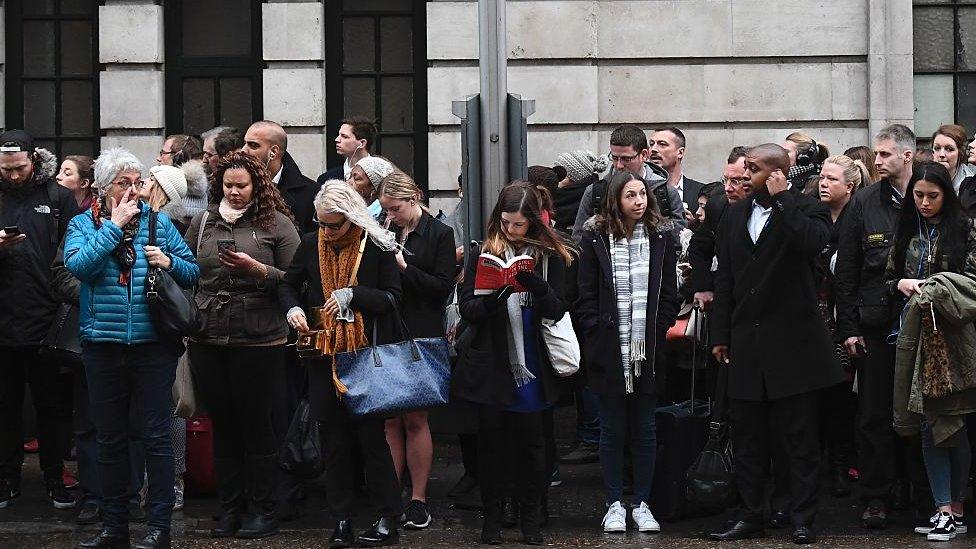Younger workers will benefit from return to office, says boss
- Published
- comments

Will workers return to daily commuting as they did before the pandemic?
Returning to work in offices will help younger staff with their careers, the boss of a pub firm has said.
Clive Watson, chief executive of City Pub Group, said junior workers needed mentors which they could not get access to while working from home.
Many people are set to return to the office this week after work-from-home guidance was ditched in England.
Mr Watson said having staff working in offices would help build the "culture" of businesses.
"Every junior staff needs a mentor, every junior staff needs to go to someone in the office to help them with their roles and they can't really do that from home," Mr Watson, whose firm owns 45 pubs, told the BBC's Today programme.
"You can bring in a flexibility to the office work-life. But I think it's very important for office workers' mental wellbeing to be back in the office and be working alongside their colleagues."
Mr Watson said people returning to offices in town and city centres was "not just to help the hospitality industry".
Transport for London said it saw 6% rise in tube journeys on Monday compared to the week before, with about 500,000 tube trips.
However, Network Rail said it was too early to tell if commuters were returning to the capital. It saw a slight drop in journeys on Monday, although the number of passengers using non-London stations rose 6%.
It said data gathered later in the week would provide a better indication of changes to commuting behaviour.
According to a Centre for Cities report, Covid-19 has cost businesses in city and large town centres more than a third (35%) of their potential takings and shut down thousands since March 2020.
Some employers have argued working from the office is more productive, with the boss of bank Goldman Sachs previously calling remote working an "aberration".
But many believe flexible working is here to stay. Last year, a BBC survey found 70% of 1,684 people polled do not believe workers will return to the office full-time when the pandemic subsides.
'I enjoy the office much more than I thought'

Ingrid Temmerman, an executive assistant at Imperial College London, worked from home during the first coronavirus lockdown, but has since changed to a role which meant she was required to work full-time in the office, until the work-from-home guidance.
She will return to the office on Monday, but said she was "mindful not to change back to old habits such as not moving from my seat".
"Before I applied for the [new] role, I had to give it some real thought as to whether I was prepared to compromise a hybrid model," she said.
"The tipping of the scale was the prospect of working in a new team in an environment that I really liked. On the days I have been back in person, I have enjoyed it very much - more than I thought I would.
"I was also given my own office in my new job, which really helps."
'I'm one of the lucky ones'
Benjamin Marlow, a fraud and crime data analyst for an insurance firm, said he returned to working from home full-time following the Omicron outbreak.
The 35-year-old said he understood his employer was looking to introduce a "phased return", with staff working in the office for two or three days a week.
Although he found working from home beneficial for his well-being and concentration levels, Mr Marlow said he was looking forward to it, as "it's good for rapport-building with colleagues".

"I think there are benefits to the workplace by maintaining workplace etiquette," he said.
Mr Marlow, from Surrey, explained he had used the time he usually spent commuting to take up running.
"I'm now at half-marathon distance, having previously not been a runner," he said. "I'm one of the lucky ones from Covid."
Some pushback ahead?
Matt from Sutton Coldfield, a recruitment consultant, told the BBC that he had "made more deals at home than I ever have in the office".
"I think I try to push myself a bit harder to prove that I'm not slacking off - perhaps it's a bit of guilt," he said.
His firm has adopted a hybrid working model, but he believes he might be asked to return full-time.
"Personally, I think there might be some pushback. Most of my colleagues are in their mid-20s to late-40s and we're all keen to keep doing what we're doing because of the better work-life balance, and the fact that it saves money on commuting."
Research by the Chartered Institute of Personnel and Development (CIPD) found more employers reported that home-working boosted productivity as the pandemic went on.
Ben Willmott, head of public policy at the CIPD, said it was expected most employers would continue "embed hybrid working arrangements" in some form.
With coronavirus infection rates in the country high, unions have raised concerns over safety.
Paul Nowak, deputy general secretary at TUC, said it was important employers carried out risk assessments.
"Rather than blanket mandates or unhelpful language about shirkers getting back to the office, employers have sensible conversations with the staff about how that return will happen," he added.
But Alex, who moved to London during the pandemic to take up a new role at a law firm, is raring to return to the office.
"As someone who's new to London, I've found it really difficult to make personal connections and network, to discover the firm culture," the 28-year-old said.
Most of his communication with colleagues is via texts or emails, so he said it was hard to feel included or get to know new co-workers.

Can my boss force me to return to the office?

Shah Qureshi is a partner and head of employment at law firm Irwin Mitchell
Shah Qureshi, partner and head of employment at law firm Irwin Mitchell, says: "Ultimately, the answer is yes" - your employer can tell you to work from the office.
However, Mr Qureshi adds that under the Health and Safety at Work Act, "employers have an obligation to ensure that there is a safe working environment, a safe workplace, to which an employee returns", irrespective of any Covid restrictions.
"There is a duty of care that the employer has to ensure that everything is safe as far as possible," says Mr Qureshi.
Mr Qureshi adds that as the law currently stands, there is no legal right for employees to work from home.

- Published20 January 2022

- Published31 January 2022

- Published9 March 2021

- Published8 June 2021
